Entrepreneurial Ventures: BTEC Unit 9 - Small Business Management
VerifiedAdded on 2023/06/14
|7
|1506
|402
Report
AI Summary
This report examines entrepreneurial ventures, focusing on small business management within the context of Marshfield Bakery. It differentiates between small and large company entrepreneurship, highlighting lifestyle and social entrepreneurial ventures. The report assesses the role of micro and small businesses in the UK economy, emphasizing their contribution to employment and innovation. It further discusses the importance of small businesses in fostering social economy growth, particularly in providing local services and employment opportunities. The analysis concludes that entrepreneurial ventures, especially small and micro businesses, are crucial for economic development and job creation.
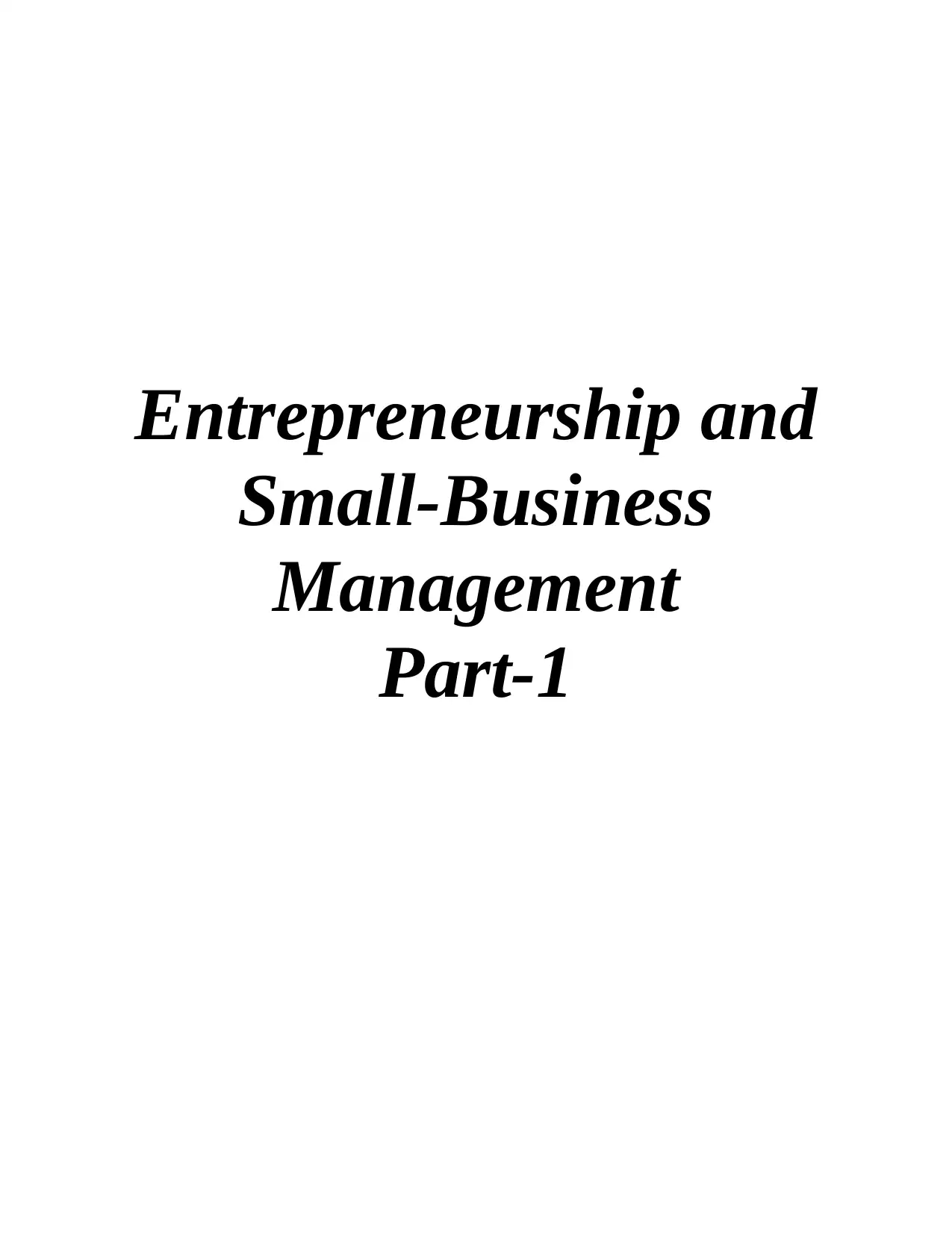
Entrepreneurship and
Small-Business
Management
Part-1
Small-Business
Management
Part-1
Paraphrase This Document
Need a fresh take? Get an instant paraphrase of this document with our AI Paraphraser
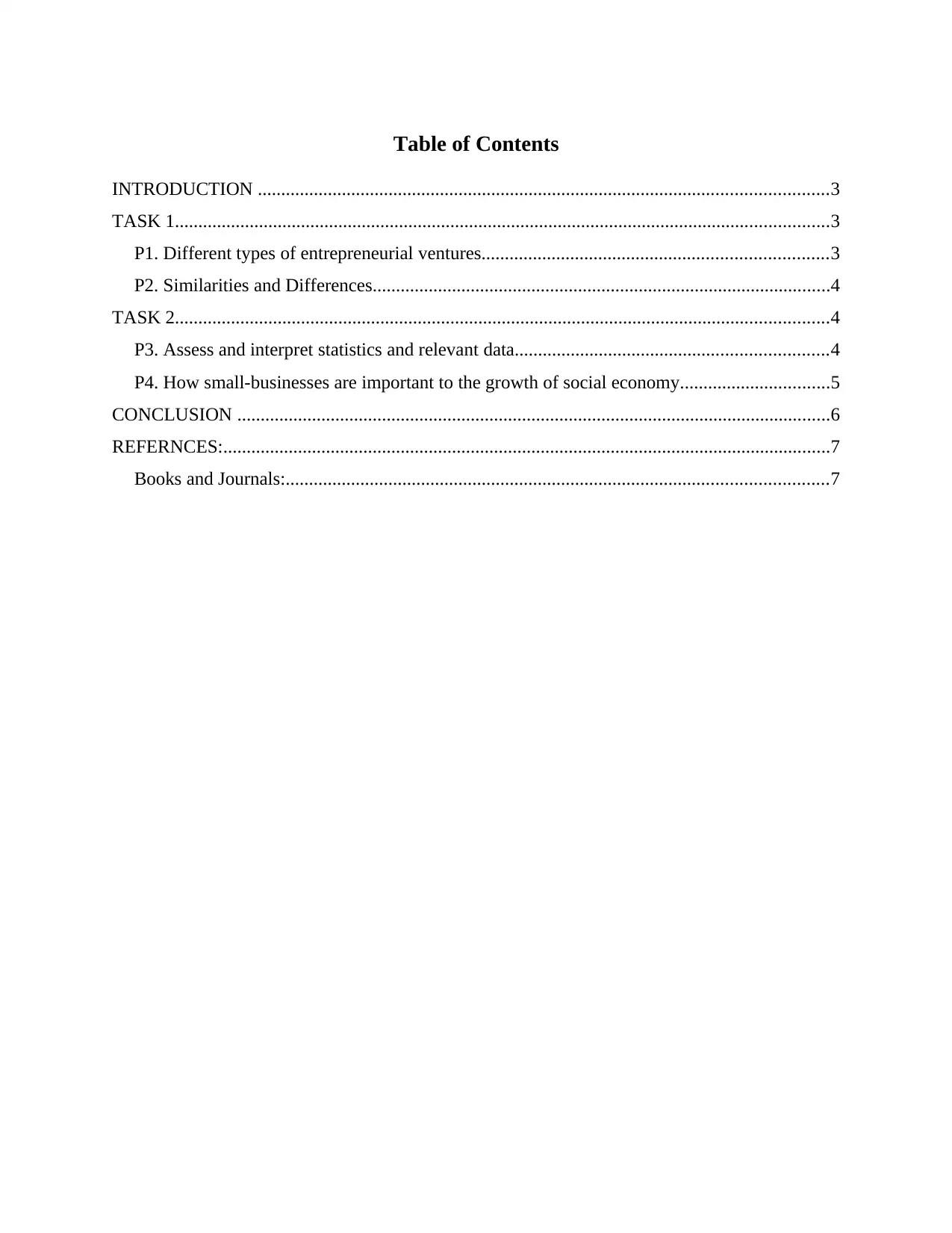
Table of Contents
INTRODUCTION ..........................................................................................................................3
TASK 1............................................................................................................................................3
P1. Different types of entrepreneurial ventures..........................................................................3
P2. Similarities and Differences..................................................................................................4
TASK 2............................................................................................................................................4
P3. Assess and interpret statistics and relevant data...................................................................4
P4. How small-businesses are important to the growth of social economy................................5
CONCLUSION ...............................................................................................................................6
REFERNCES:..................................................................................................................................7
Books and Journals:....................................................................................................................7
INTRODUCTION ..........................................................................................................................3
TASK 1............................................................................................................................................3
P1. Different types of entrepreneurial ventures..........................................................................3
P2. Similarities and Differences..................................................................................................4
TASK 2............................................................................................................................................4
P3. Assess and interpret statistics and relevant data...................................................................4
P4. How small-businesses are important to the growth of social economy................................5
CONCLUSION ...............................................................................................................................6
REFERNCES:..................................................................................................................................7
Books and Journals:....................................................................................................................7
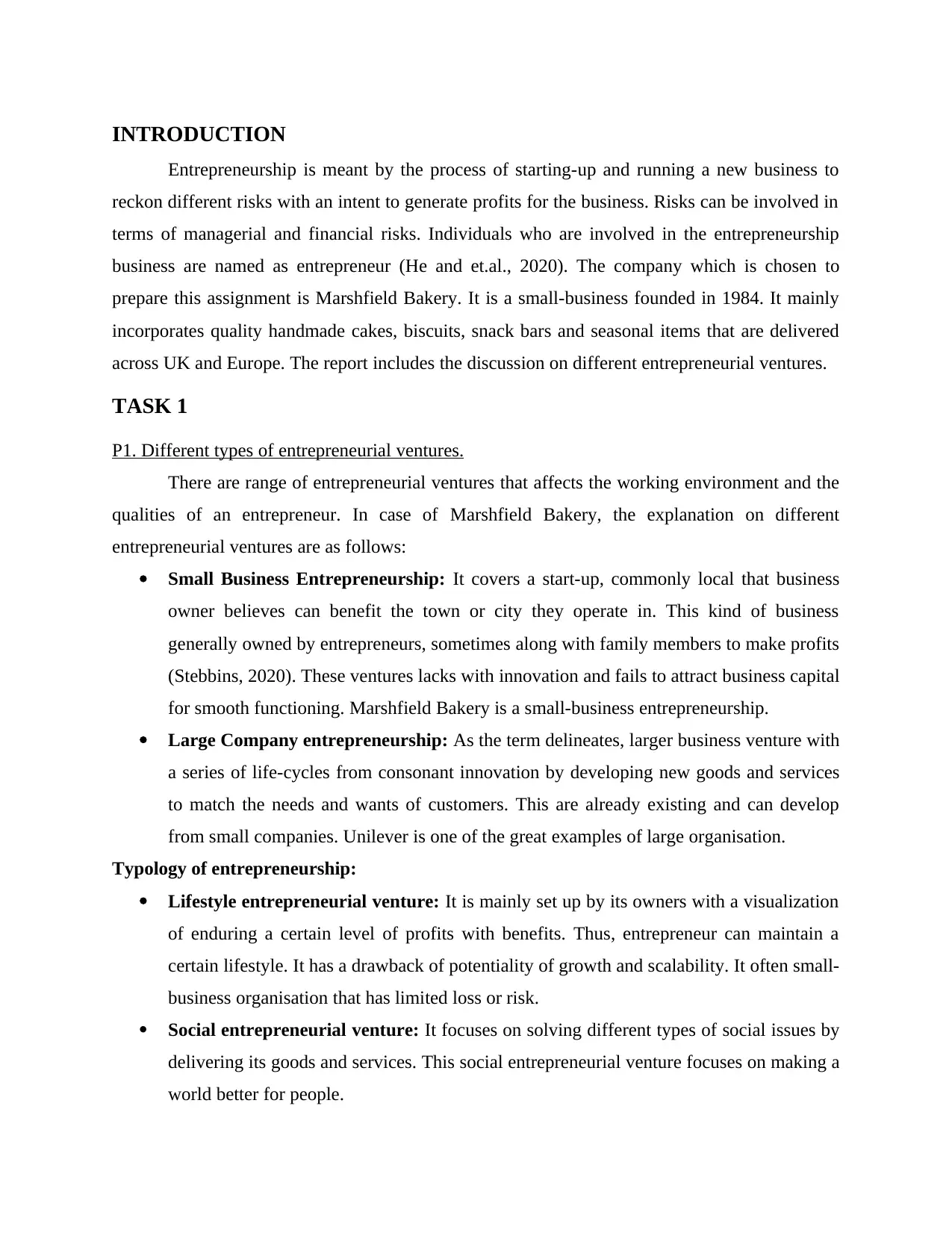
INTRODUCTION
Entrepreneurship is meant by the process of starting-up and running a new business to
reckon different risks with an intent to generate profits for the business. Risks can be involved in
terms of managerial and financial risks. Individuals who are involved in the entrepreneurship
business are named as entrepreneur (He and et.al., 2020). The company which is chosen to
prepare this assignment is Marshfield Bakery. It is a small-business founded in 1984. It mainly
incorporates quality handmade cakes, biscuits, snack bars and seasonal items that are delivered
across UK and Europe. The report includes the discussion on different entrepreneurial ventures.
TASK 1
P1. Different types of entrepreneurial ventures.
There are range of entrepreneurial ventures that affects the working environment and the
qualities of an entrepreneur. In case of Marshfield Bakery, the explanation on different
entrepreneurial ventures are as follows:
Small Business Entrepreneurship: It covers a start-up, commonly local that business
owner believes can benefit the town or city they operate in. This kind of business
generally owned by entrepreneurs, sometimes along with family members to make profits
(Stebbins, 2020). These ventures lacks with innovation and fails to attract business capital
for smooth functioning. Marshfield Bakery is a small-business entrepreneurship.
Large Company entrepreneurship: As the term delineates, larger business venture with
a series of life-cycles from consonant innovation by developing new goods and services
to match the needs and wants of customers. This are already existing and can develop
from small companies. Unilever is one of the great examples of large organisation.
Typology of entrepreneurship:
Lifestyle entrepreneurial venture: It is mainly set up by its owners with a visualization
of enduring a certain level of profits with benefits. Thus, entrepreneur can maintain a
certain lifestyle. It has a drawback of potentiality of growth and scalability. It often small-
business organisation that has limited loss or risk.
Social entrepreneurial venture: It focuses on solving different types of social issues by
delivering its goods and services. This social entrepreneurial venture focuses on making a
world better for people.
Entrepreneurship is meant by the process of starting-up and running a new business to
reckon different risks with an intent to generate profits for the business. Risks can be involved in
terms of managerial and financial risks. Individuals who are involved in the entrepreneurship
business are named as entrepreneur (He and et.al., 2020). The company which is chosen to
prepare this assignment is Marshfield Bakery. It is a small-business founded in 1984. It mainly
incorporates quality handmade cakes, biscuits, snack bars and seasonal items that are delivered
across UK and Europe. The report includes the discussion on different entrepreneurial ventures.
TASK 1
P1. Different types of entrepreneurial ventures.
There are range of entrepreneurial ventures that affects the working environment and the
qualities of an entrepreneur. In case of Marshfield Bakery, the explanation on different
entrepreneurial ventures are as follows:
Small Business Entrepreneurship: It covers a start-up, commonly local that business
owner believes can benefit the town or city they operate in. This kind of business
generally owned by entrepreneurs, sometimes along with family members to make profits
(Stebbins, 2020). These ventures lacks with innovation and fails to attract business capital
for smooth functioning. Marshfield Bakery is a small-business entrepreneurship.
Large Company entrepreneurship: As the term delineates, larger business venture with
a series of life-cycles from consonant innovation by developing new goods and services
to match the needs and wants of customers. This are already existing and can develop
from small companies. Unilever is one of the great examples of large organisation.
Typology of entrepreneurship:
Lifestyle entrepreneurial venture: It is mainly set up by its owners with a visualization
of enduring a certain level of profits with benefits. Thus, entrepreneur can maintain a
certain lifestyle. It has a drawback of potentiality of growth and scalability. It often small-
business organisation that has limited loss or risk.
Social entrepreneurial venture: It focuses on solving different types of social issues by
delivering its goods and services. This social entrepreneurial venture focuses on making a
world better for people.
⊘ This is a preview!⊘
Do you want full access?
Subscribe today to unlock all pages.

Trusted by 1+ million students worldwide
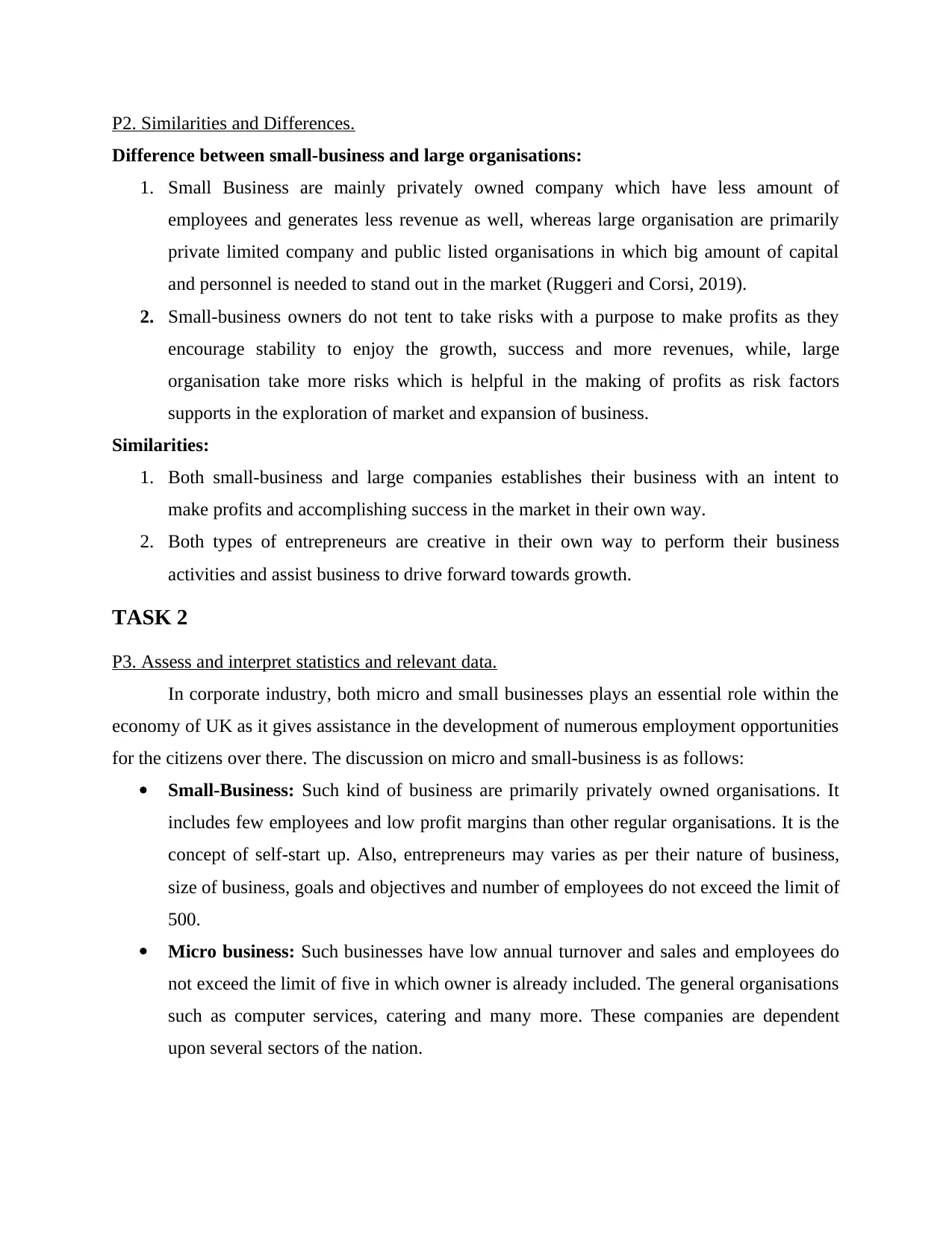
P2. Similarities and Differences.
Difference between small-business and large organisations:
1. Small Business are mainly privately owned company which have less amount of
employees and generates less revenue as well, whereas large organisation are primarily
private limited company and public listed organisations in which big amount of capital
and personnel is needed to stand out in the market (Ruggeri and Corsi, 2019).
2. Small-business owners do not tent to take risks with a purpose to make profits as they
encourage stability to enjoy the growth, success and more revenues, while, large
organisation take more risks which is helpful in the making of profits as risk factors
supports in the exploration of market and expansion of business.
Similarities:
1. Both small-business and large companies establishes their business with an intent to
make profits and accomplishing success in the market in their own way.
2. Both types of entrepreneurs are creative in their own way to perform their business
activities and assist business to drive forward towards growth.
TASK 2
P3. Assess and interpret statistics and relevant data.
In corporate industry, both micro and small businesses plays an essential role within the
economy of UK as it gives assistance in the development of numerous employment opportunities
for the citizens over there. The discussion on micro and small-business is as follows:
Small-Business: Such kind of business are primarily privately owned organisations. It
includes few employees and low profit margins than other regular organisations. It is the
concept of self-start up. Also, entrepreneurs may varies as per their nature of business,
size of business, goals and objectives and number of employees do not exceed the limit of
500.
Micro business: Such businesses have low annual turnover and sales and employees do
not exceed the limit of five in which owner is already included. The general organisations
such as computer services, catering and many more. These companies are dependent
upon several sectors of the nation.
Difference between small-business and large organisations:
1. Small Business are mainly privately owned company which have less amount of
employees and generates less revenue as well, whereas large organisation are primarily
private limited company and public listed organisations in which big amount of capital
and personnel is needed to stand out in the market (Ruggeri and Corsi, 2019).
2. Small-business owners do not tent to take risks with a purpose to make profits as they
encourage stability to enjoy the growth, success and more revenues, while, large
organisation take more risks which is helpful in the making of profits as risk factors
supports in the exploration of market and expansion of business.
Similarities:
1. Both small-business and large companies establishes their business with an intent to
make profits and accomplishing success in the market in their own way.
2. Both types of entrepreneurs are creative in their own way to perform their business
activities and assist business to drive forward towards growth.
TASK 2
P3. Assess and interpret statistics and relevant data.
In corporate industry, both micro and small businesses plays an essential role within the
economy of UK as it gives assistance in the development of numerous employment opportunities
for the citizens over there. The discussion on micro and small-business is as follows:
Small-Business: Such kind of business are primarily privately owned organisations. It
includes few employees and low profit margins than other regular organisations. It is the
concept of self-start up. Also, entrepreneurs may varies as per their nature of business,
size of business, goals and objectives and number of employees do not exceed the limit of
500.
Micro business: Such businesses have low annual turnover and sales and employees do
not exceed the limit of five in which owner is already included. The general organisations
such as computer services, catering and many more. These companies are dependent
upon several sectors of the nation.
Paraphrase This Document
Need a fresh take? Get an instant paraphrase of this document with our AI Paraphraser
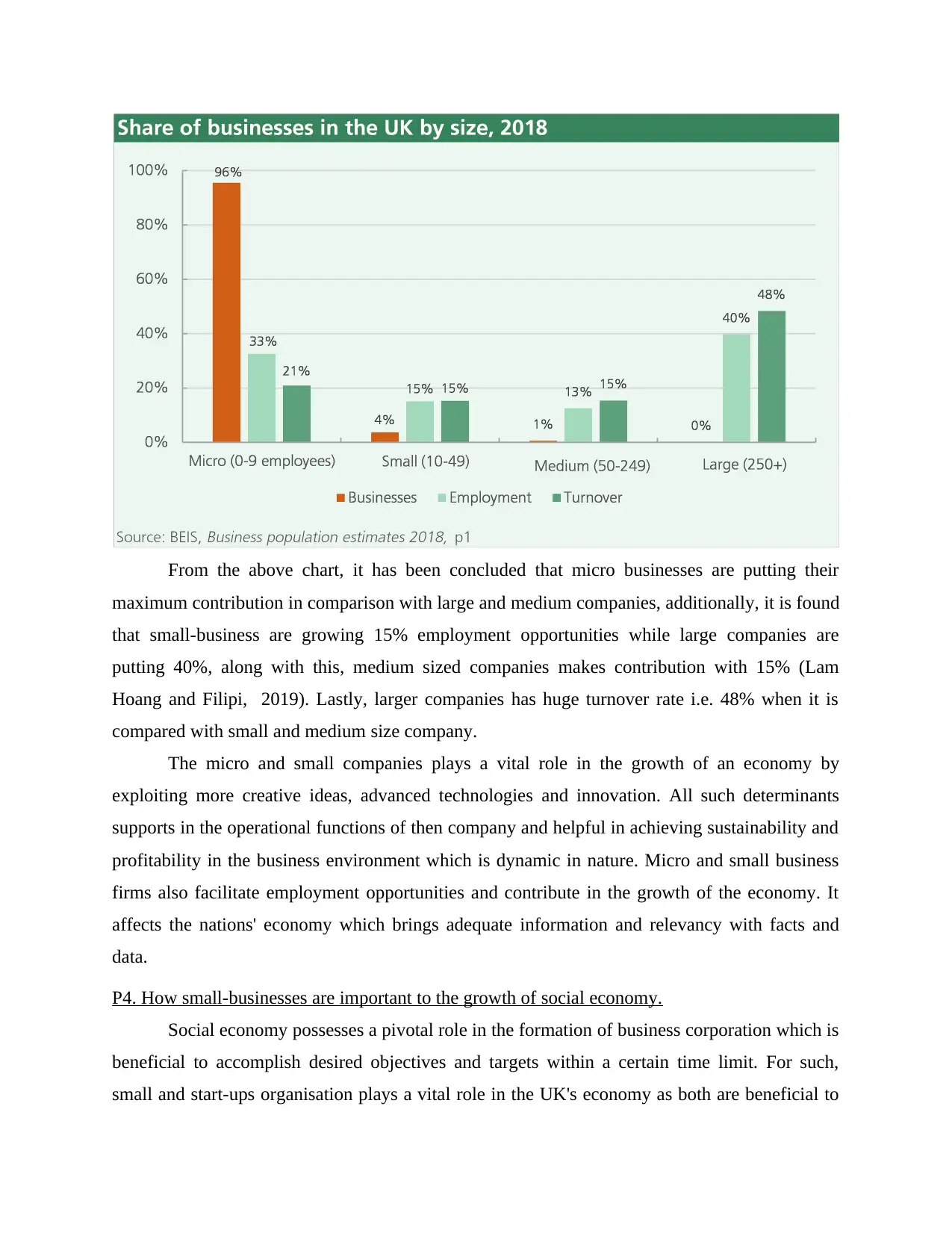
From the above chart, it has been concluded that micro businesses are putting their
maximum contribution in comparison with large and medium companies, additionally, it is found
that small-business are growing 15% employment opportunities while large companies are
putting 40%, along with this, medium sized companies makes contribution with 15% (Lam
Hoang and Filipi, 2019). Lastly, larger companies has huge turnover rate i.e. 48% when it is
compared with small and medium size company.
The micro and small companies plays a vital role in the growth of an economy by
exploiting more creative ideas, advanced technologies and innovation. All such determinants
supports in the operational functions of then company and helpful in achieving sustainability and
profitability in the business environment which is dynamic in nature. Micro and small business
firms also facilitate employment opportunities and contribute in the growth of the economy. It
affects the nations' economy which brings adequate information and relevancy with facts and
data.
P4. How small-businesses are important to the growth of social economy.
Social economy possesses a pivotal role in the formation of business corporation which is
beneficial to accomplish desired objectives and targets within a certain time limit. For such,
small and start-ups organisation plays a vital role in the UK's economy as both are beneficial to
maximum contribution in comparison with large and medium companies, additionally, it is found
that small-business are growing 15% employment opportunities while large companies are
putting 40%, along with this, medium sized companies makes contribution with 15% (Lam
Hoang and Filipi, 2019). Lastly, larger companies has huge turnover rate i.e. 48% when it is
compared with small and medium size company.
The micro and small companies plays a vital role in the growth of an economy by
exploiting more creative ideas, advanced technologies and innovation. All such determinants
supports in the operational functions of then company and helpful in achieving sustainability and
profitability in the business environment which is dynamic in nature. Micro and small business
firms also facilitate employment opportunities and contribute in the growth of the economy. It
affects the nations' economy which brings adequate information and relevancy with facts and
data.
P4. How small-businesses are important to the growth of social economy.
Social economy possesses a pivotal role in the formation of business corporation which is
beneficial to accomplish desired objectives and targets within a certain time limit. For such,
small and start-ups organisation plays a vital role in the UK's economy as both are beneficial to
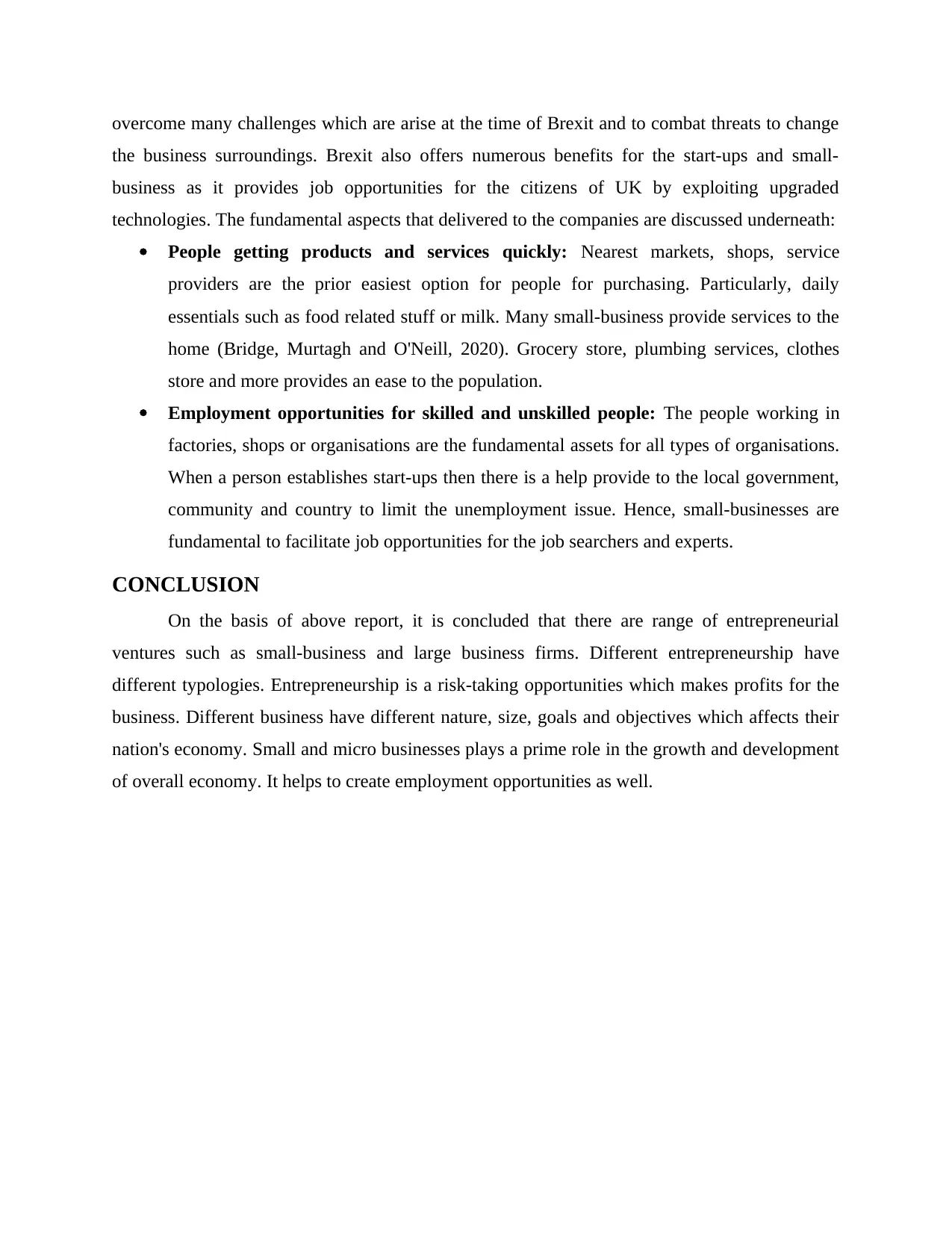
overcome many challenges which are arise at the time of Brexit and to combat threats to change
the business surroundings. Brexit also offers numerous benefits for the start-ups and small-
business as it provides job opportunities for the citizens of UK by exploiting upgraded
technologies. The fundamental aspects that delivered to the companies are discussed underneath:
People getting products and services quickly: Nearest markets, shops, service
providers are the prior easiest option for people for purchasing. Particularly, daily
essentials such as food related stuff or milk. Many small-business provide services to the
home (Bridge, Murtagh and O'Neill, 2020). Grocery store, plumbing services, clothes
store and more provides an ease to the population.
Employment opportunities for skilled and unskilled people: The people working in
factories, shops or organisations are the fundamental assets for all types of organisations.
When a person establishes start-ups then there is a help provide to the local government,
community and country to limit the unemployment issue. Hence, small-businesses are
fundamental to facilitate job opportunities for the job searchers and experts.
CONCLUSION
On the basis of above report, it is concluded that there are range of entrepreneurial
ventures such as small-business and large business firms. Different entrepreneurship have
different typologies. Entrepreneurship is a risk-taking opportunities which makes profits for the
business. Different business have different nature, size, goals and objectives which affects their
nation's economy. Small and micro businesses plays a prime role in the growth and development
of overall economy. It helps to create employment opportunities as well.
the business surroundings. Brexit also offers numerous benefits for the start-ups and small-
business as it provides job opportunities for the citizens of UK by exploiting upgraded
technologies. The fundamental aspects that delivered to the companies are discussed underneath:
People getting products and services quickly: Nearest markets, shops, service
providers are the prior easiest option for people for purchasing. Particularly, daily
essentials such as food related stuff or milk. Many small-business provide services to the
home (Bridge, Murtagh and O'Neill, 2020). Grocery store, plumbing services, clothes
store and more provides an ease to the population.
Employment opportunities for skilled and unskilled people: The people working in
factories, shops or organisations are the fundamental assets for all types of organisations.
When a person establishes start-ups then there is a help provide to the local government,
community and country to limit the unemployment issue. Hence, small-businesses are
fundamental to facilitate job opportunities for the job searchers and experts.
CONCLUSION
On the basis of above report, it is concluded that there are range of entrepreneurial
ventures such as small-business and large business firms. Different entrepreneurship have
different typologies. Entrepreneurship is a risk-taking opportunities which makes profits for the
business. Different business have different nature, size, goals and objectives which affects their
nation's economy. Small and micro businesses plays a prime role in the growth and development
of overall economy. It helps to create employment opportunities as well.
⊘ This is a preview!⊘
Do you want full access?
Subscribe today to unlock all pages.

Trusted by 1+ million students worldwide
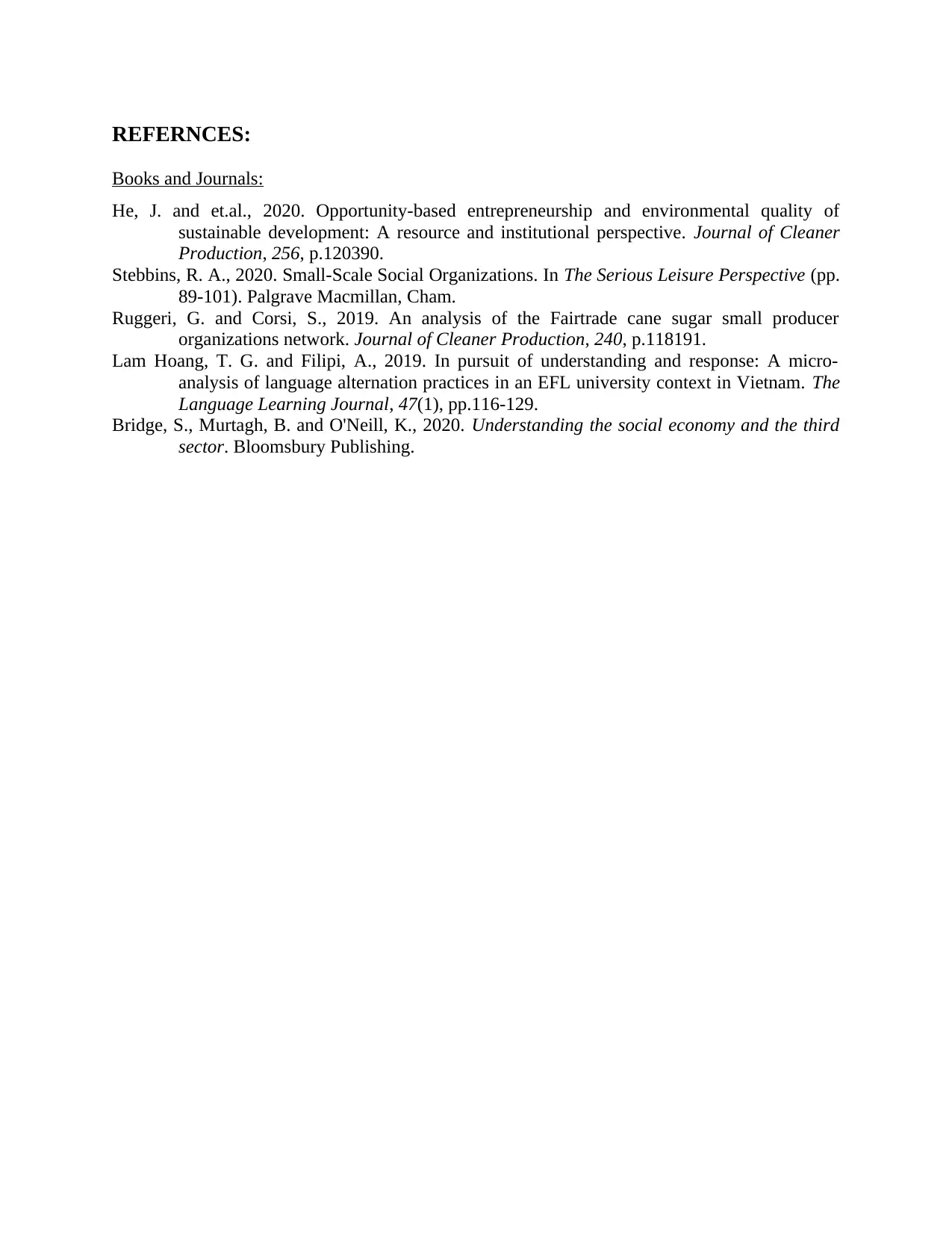
REFERNCES:
Books and Journals:
He, J. and et.al., 2020. Opportunity-based entrepreneurship and environmental quality of
sustainable development: A resource and institutional perspective. Journal of Cleaner
Production, 256, p.120390.
Stebbins, R. A., 2020. Small-Scale Social Organizations. In The Serious Leisure Perspective (pp.
89-101). Palgrave Macmillan, Cham.
Ruggeri, G. and Corsi, S., 2019. An analysis of the Fairtrade cane sugar small producer
organizations network. Journal of Cleaner Production, 240, p.118191.
Lam Hoang, T. G. and Filipi, A., 2019. In pursuit of understanding and response: A micro-
analysis of language alternation practices in an EFL university context in Vietnam. The
Language Learning Journal, 47(1), pp.116-129.
Bridge, S., Murtagh, B. and O'Neill, K., 2020. Understanding the social economy and the third
sector. Bloomsbury Publishing.
Books and Journals:
He, J. and et.al., 2020. Opportunity-based entrepreneurship and environmental quality of
sustainable development: A resource and institutional perspective. Journal of Cleaner
Production, 256, p.120390.
Stebbins, R. A., 2020. Small-Scale Social Organizations. In The Serious Leisure Perspective (pp.
89-101). Palgrave Macmillan, Cham.
Ruggeri, G. and Corsi, S., 2019. An analysis of the Fairtrade cane sugar small producer
organizations network. Journal of Cleaner Production, 240, p.118191.
Lam Hoang, T. G. and Filipi, A., 2019. In pursuit of understanding and response: A micro-
analysis of language alternation practices in an EFL university context in Vietnam. The
Language Learning Journal, 47(1), pp.116-129.
Bridge, S., Murtagh, B. and O'Neill, K., 2020. Understanding the social economy and the third
sector. Bloomsbury Publishing.
1 out of 7
Related Documents
Your All-in-One AI-Powered Toolkit for Academic Success.
+13062052269
info@desklib.com
Available 24*7 on WhatsApp / Email
![[object Object]](/_next/static/media/star-bottom.7253800d.svg)
Unlock your academic potential
Copyright © 2020–2026 A2Z Services. All Rights Reserved. Developed and managed by ZUCOL.




